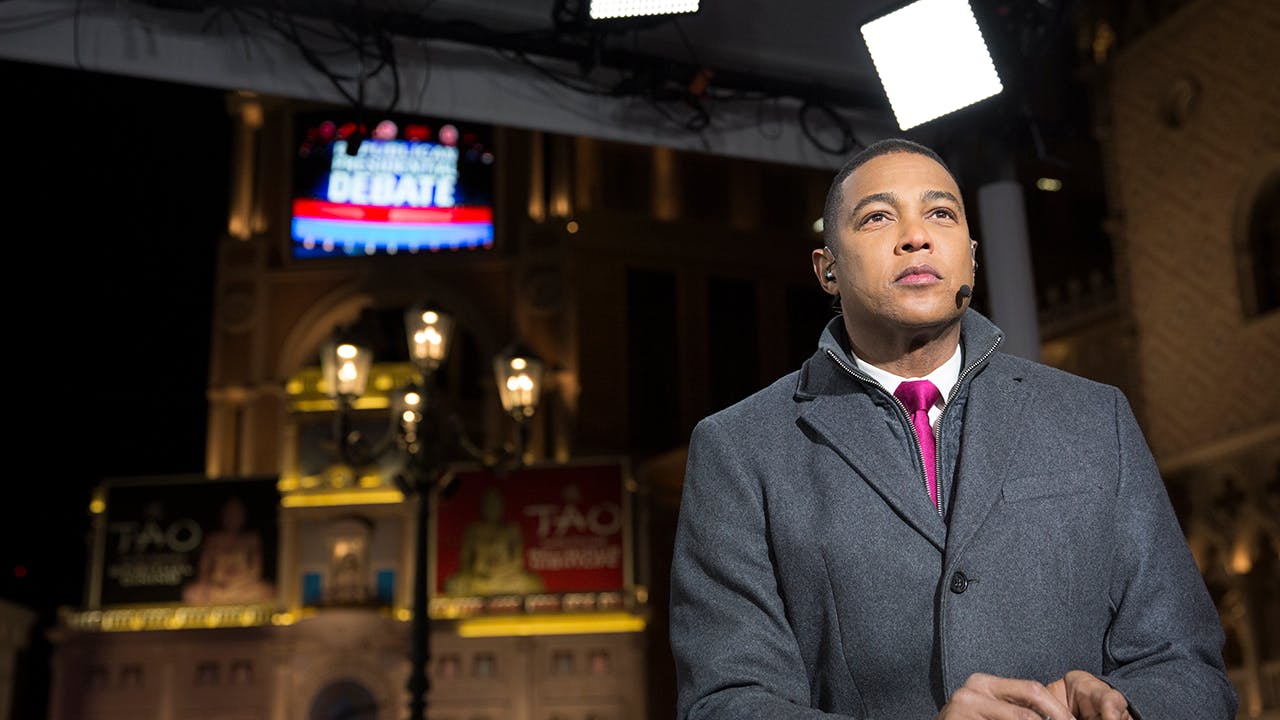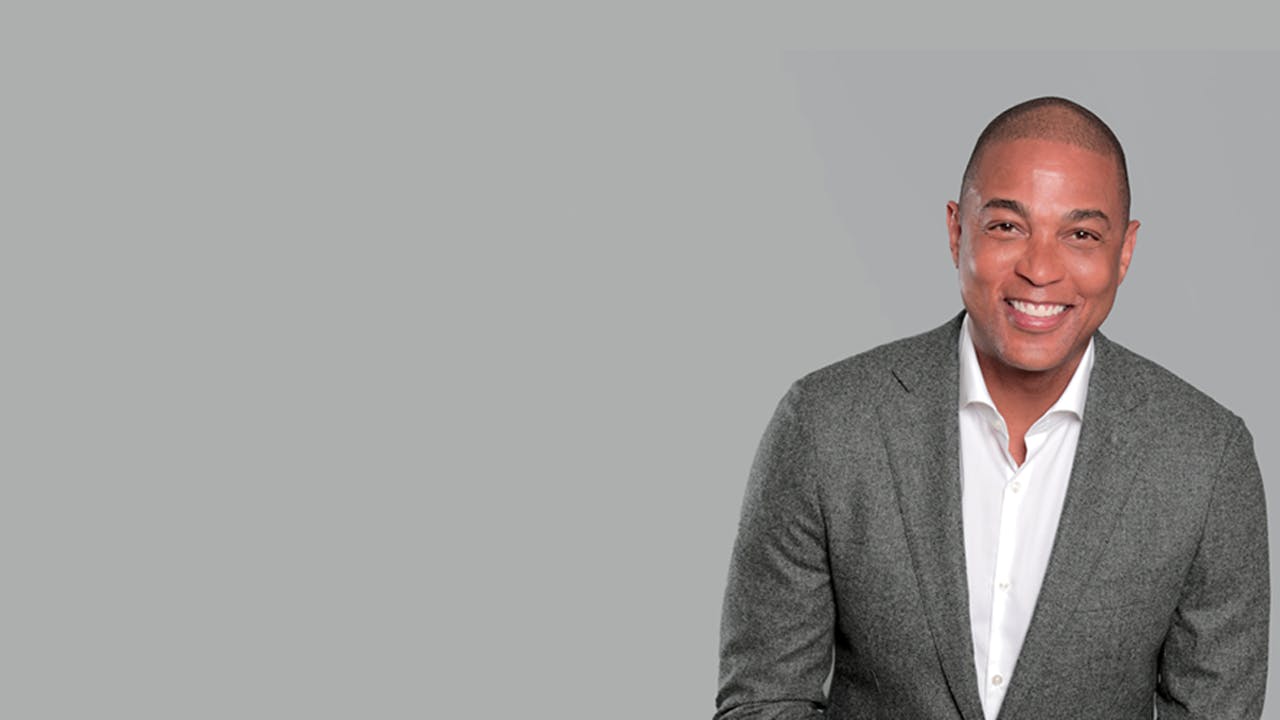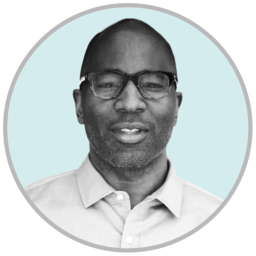DON LEMON HAS SPENT DECADES IN the news business, and he’s had a front-row seat for the massive changes sweeping the industry. He has won numerous accolades for his work as a television news anchor, including an Emmy and the prestigious Edward R. Murrow Award. Lemon has worked at CNN for over ten years, and he’s currently the host of CNN Tonight. Known for his outspoken point of view, Lemon is passionate about the position of the media business in politics and society, as well as his own role in that business.
Historically, broadcast media was the primary source of news for people around the world. Social media and other platforms have reshaped the way we are informed, and in some cases, have sown disbelief or distrust for traditional journalism. Do you think journalism is in crisis?
No, absolutely not. Journalism is not in crisis. It’s under attack. It is under attack by the administration and the president of the United States. And by some people who may not want to believe in facts when the facts are not on their side. But rather than disbelief, I would like to say skepticism—and skepticism is always good when it comes to anything, especially when it comes to journalism. You should always question, question, question. I think we need a bit more of that, for people to question where things come from. The reality, the facts behind all of it. So while I do think journalism is under attack—and this may sound odd—it’s a good thing because it makes us better, and it makes us more important and relevant and essential in these times.
Do you think we’re entangled in some sort of battle for the truth, or a battle for perspectives on the truth?
For journalists, the battle for truth is the battle to put it out there. For others, it’s a battle for control, for people who don’t want the truth out there, who don’t believe in the truth, and who try to tell you that truth is relative, or it’s nebulous in some way, or truth doesn’t really matter. Truth always matters. And the truth always comes out.
Do you think social media platforms have a responsibility regarding what content is distributed to their audiences?
Of course. Of course they do. That’s the thing people don’t get about freedom of speech and freedom of expression. Of course you have the right to that. But no one has a right to a certain platform, especially if it’s privately owned. You don’t have to give someone a platform, especially if someone is spreading false information intentionally. And even if they’re doing it without really understanding it. If they continuously do it without apologizing for it, or making people aware that something is false, and they just continue to do it … I don’t think you have to give people that platform. And I think that all media organizations—social media, traditional media, legacy media, mainstream media—we’re all responsible for truth and facts and an informed electorate and an informed society. And you cannot be informed by someone who continuously and knowingly spreads false information.
What responsibility do social media platforms have for someone on their platform who has a huge audience, and a lot of influence, but isn’t interested in the truth?
The responsibility is to call a lie a lie, and to not let it sit there. And some people may get upset by it. Some people may think that it’s being partisan or biased, but it’s not. In these times, I think it can feel that way—the truth can feel like it’s biased or partisan when the truth is not on the side of the person who is telling it. And so the people who follow that person, or the people who are saying it, will say, “Oh, you’re just being biased.” No, the truth is always the truth.
How has Donald Trump affected journalism?
I think he’s made us stronger. I think we have to be strong, and we have to make sure that we are accurate. When you’re under attack, and you’re under scrutiny, you really mind yourself, you up your game because you have to be better to overcome the accusations and to prove the other person wrong. And to just do your job. It’s like your mom would always say, “Well some of us have to work three times harder.” I think journalism is working three times harder right now, and that’s not such a bad place to be.
What do you see as the positive aspects of social media giving more people a voice?
Diversity is good. Inclusion is always good. It gives people a platform that didn’t necessarily have one. And it gives people a voice who may not necessarily have had one. They have the opportunity to say what they want, when they may not necessarily be heard in traditional media. But we have to be careful, and we have to be aware that there are no parameters, no fact checkers, no “standards and practices” behind that. So it’s fine to get your opinion out there. But your opinion is not necessarily the truth. It may be your reality, it may be what you want, but it’s not necessarily the truth.
Considering all the tumult in American politics, how do you prepare yourself for the news cycle every day?
I have to read everything. I have to be dialed in for everything. Of course I want to be informed, I want to be knowledgeable. But the most important thing is to be nimble—to change and rejigger at the drop of a hat.
Sometimes, 30 minutes before the show, the entire landscape will change. Sometimes it will be 15 minutes before the show. Sometimes it will happen in the opening of my show, when I’m sitting down, they’ll say, “Okay. This just happened. This person has resigned. This person was fired. This person has been indicted.” You have to be agile. I just have to navigate it and not be stuck to form.
“I have to read everything.I have to be dialed in for everything.”
How would you characterize President Trump’s use of Twitter?
Irresponsible. Unpresidential. Childish in many instances, uninformed in most instances. Like on the anniversary of 9/11, he tweeted, “17 years since September 11th!” Which is true, but there is no empathy there. There is no message, there is no comfort there. There is no “we’re here, this happened to us, where do we go from here. I am your leader, here’s how I’m going to take us beyond this moment.” Then you look at the response from presidents before him—President Obama, President Bush, President Clinton. And it’s completely different. I personally think it’s embarrassing that you have the president using social media, and especially Twitter, in such a dangerous and irresponsible way.
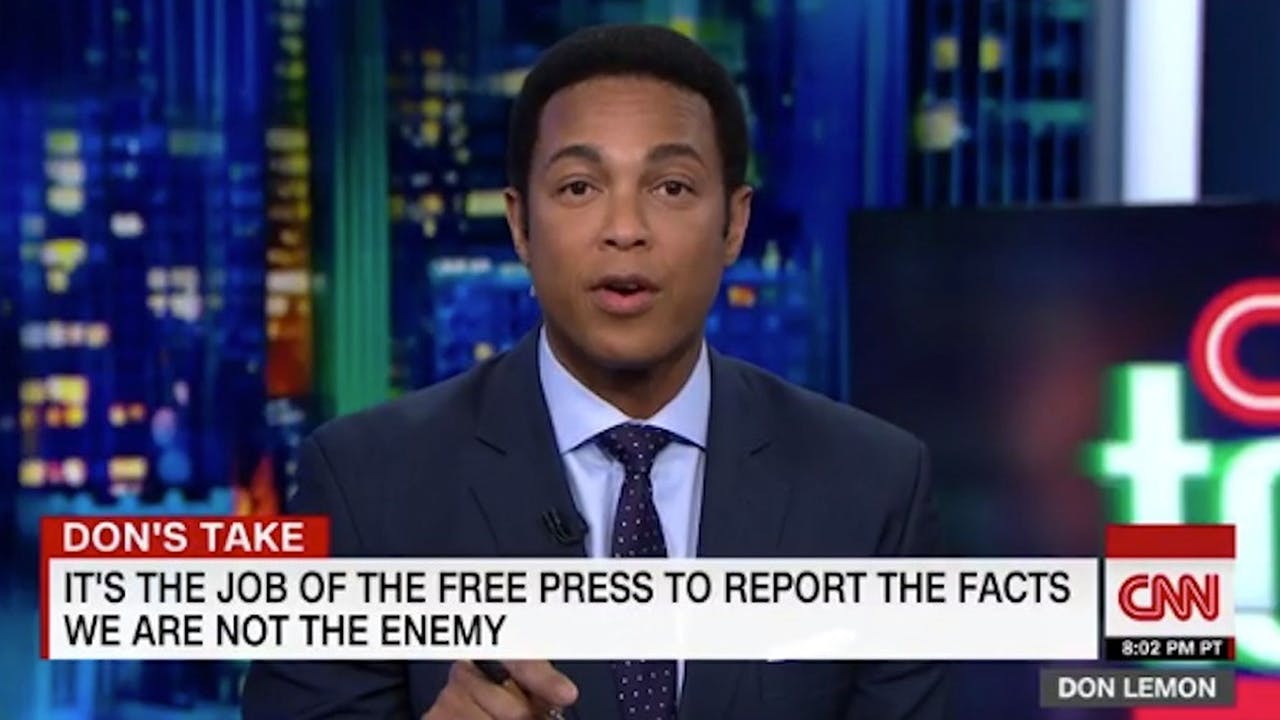
Let’s put it this way. You’re the president of the United States, which essentially makes you the leader of the free world. So if you want something to have a gravity to it, you issue a statement from that noble office. And it comes down as an edict or something that carries weight. Do you really want it to be on the same medium as everybody else? It’s great that you’re out there. But if you have to send a message to the world, do you want it to come over Twitter, where people are taking pictures of their food?
Who do you think people trust more— traditional media or social media?
People trust traditional media more. I mean, do you believe everything you see on social media?
“Irresponsible. Unpresidential. Childish in many instances, uninformed in most instances.”
Well, I believe that kittens can actually open doors.
Okay! All you have to do is look at how social media sites like Facebook and Twitter have had to change their platforms because of the fake news. And I don’t think you really have that issue in traditional media. If traditional media makes a mistake, we say we made a mistake, and here’s the real truth. You don’t have that with social media. People go on social media in large part to have their own beliefs reconfirmed.
Can anything be done to make authentic news content more prominent?
Traditional news outlets are pretty much doing that. They’ve been doing it for centuries. There are practices in place to make sure that bad information doesn’t get out, or gets out as little as possible. It is not just incumbent on an outlet or a platform to do that; it’s also incumbent upon the consumer. You have to become — we have to become — more media-literate in this country. We have to be able to suss out what’s real, what’s not, who’s trying to lead you in a certain direction, and who’s not. I’m not exactly sure how we do that. Maybe that’s something that we teach in schools.
But as someone who is in the media, I will tell you that you should not get your news from just one site. You shouldn’t sit at home all day and watch one news channel—and I mean that for us as well. If you watch CNN, then you should read The Washington Post, The New York Times, The Wall Street Journal. Every once in a while, you should flip it over to Fox. Every once in a while, you should flip it over to NBC or ABC or CBS. Because you want to hear different perspectives.
Of course, I want to watch who I want to watch. But I also have to listen to and read the things that I may not necessarily agree with or know about. And once I do that, I also have to check the facts behind it. Because if you watch one certain news network, you will think the biggest crisis in this country is uranium and Hillary Clinton, or emails and Hillary Clinton. You figure it out. I tend to think that the person who is in power now is the person who needs to be held accountable. And if that person is being investigated for their campaign and in misusing the electoral process or the election process, I think that’s more important than the past—someone who is not in office.
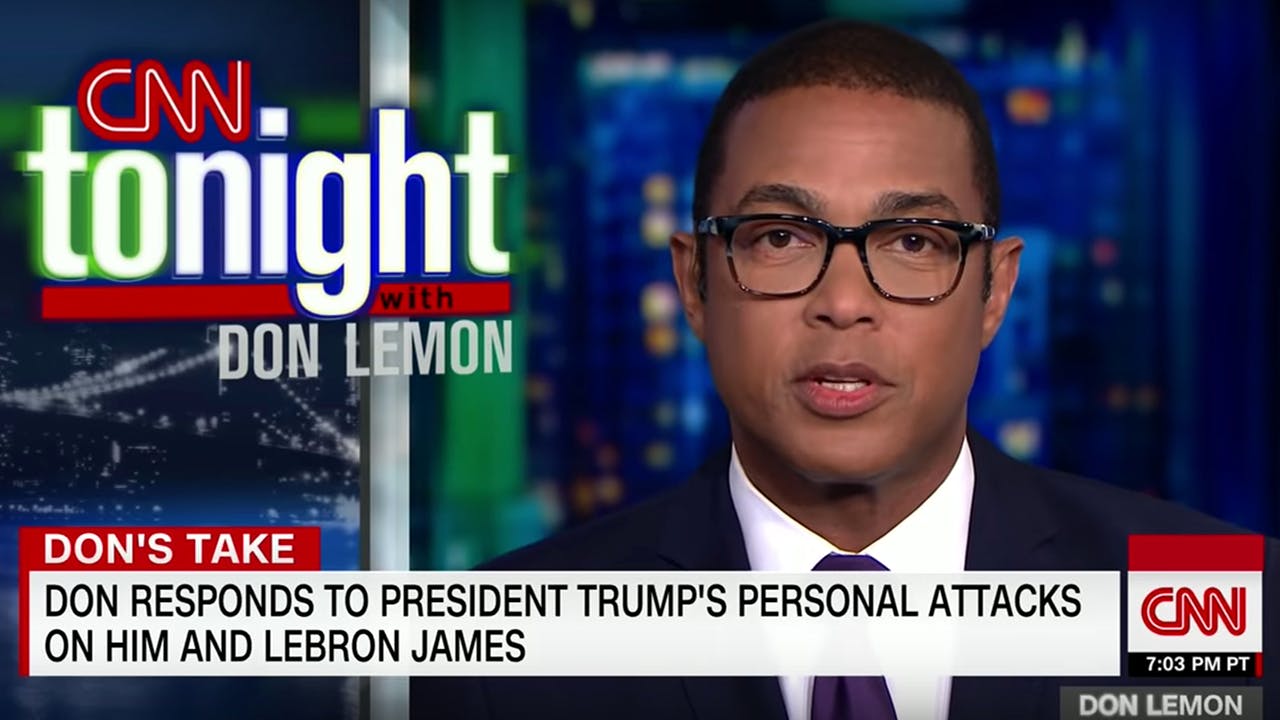
Considering President Trump’s attitude toward race, where does the dialogue about race in America go from here without him?
If you have someone who is bringing up these issues, you should look at it as an opportunity to join that space, and get in there, and mix it up, and discuss how we deal with it. He’s bringing these issues to the fore. A lot of people of color—most people of color—don’t like the way he deals with racial issues. They don’t like the way he treats African Americans. … They don’t like that there are no African Americans in the West Wing. So get out there and talk about it, and say what you have to say.
What do you think happens to this administration if the midterm elections go against them in a “blue wave”?
If there is a blue wave—I’m not sure there will be one, but if there is—there’ll be more checks and balances when it comes to this particular administration. Because as we can see, the folks in Washington, especially the Republicans in Washington, are not holding this president accountable. They’re just going along with whatever he says because they’re getting their agenda across. So they don’t want to criticize him. If there is a blue wave, I don’t know if you’ll see the president change his tune. Maybe he’ll get so frustrated or just throw his hands up and say I can’t deal with this anymore, I’m done with this. But I think that way, it’ll be the way it’s supposed to be. There’s a reason there is a left and a right. To keep balance. There is no balance right now. I think a blue wave will offer some balance and some comfort to the American people.
“There’s a certain culture that’s used to having things their way. "
How do we restore respect and friendship around the world?
I think there’s a pendulum, and it always swings. Right now, it’s swinging to the right. And I don’t know if it’s going to be a blip. I think that it will be corrected, and things will change. Whatever the new normal is … we’ll have to figure that out. But I don’t think we’ll ever get back to exactly where we were. People who are in power are afraid of change. If you are used to being the preeminent voice, the dominant culture, and all of a sudden you see people having opportunities where their lives are just as good as yours, you might say, “Hey, wait a minute. The world is not that way.” And especially if you think that other people having opportunities takes opportunities away from you … which is a very limited and small way of thinking, and yet I think a lot of the world thinks that way, especially in Western civilization.
There’s a certain culture that’s used to having things their way. And now that the world is becoming browner, a lot of people are afraid of that. Pretty soon, America is going to be a “minority majority” country. If you were in the shoes of the person or the group that’s used to having the power, and you see that shifting, you might be a bit concerned. You might be a bit afraid. But you have to make sure that the way you’re governing yourself is not through fear, but through awareness.
I believe this too shall pass. I don’t believe things are going to be exactly the way they were. I don’t think it’s gonna be easy. I don’t think it’s going to be a blip that will change overnight. But I think this is a moment where people wake up. Realize the power that you have, the power that you have in your own self, in your communities and especially at the polling place. If you want change, then you have to be involved in the system. You have to be involved in the process. You can’t just sit back.
